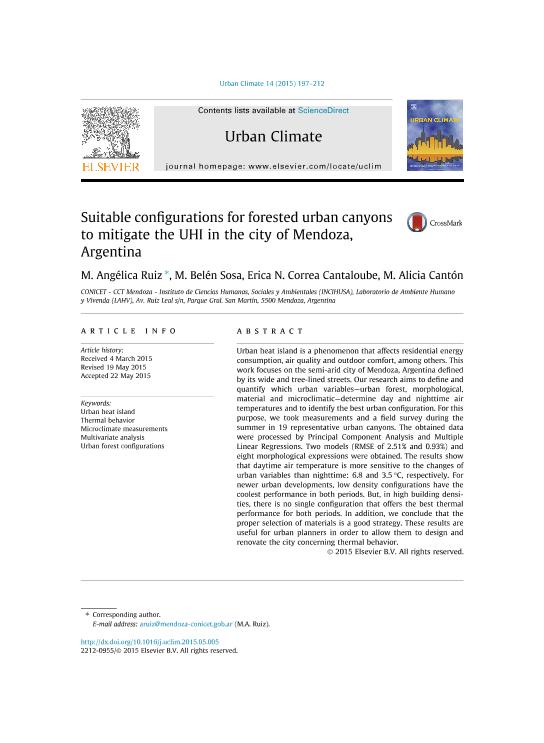Artículo
Suitable configurations for forested urban canyons to mitigate the UHI in the city of Mendoza, Argentina
Fecha de publicación:
12/2015
Editorial:
Elsevier
Revista:
Urban Climate
ISSN:
2212-0955
Idioma:
Inglés
Tipo de recurso:
Artículo publicado
Clasificación temática:
Resumen
Urban heat island is a phenomenon that affects residential energy consumption, air quality and outdoor comfort, among others. This work focuses on the semi-arid city of Mendoza, Argentina defined by its wide and tree-lined streets. Our research aims to define and quantify which urban variables-urban forest, morphological, material and microclimatic-determine day and nighttime air temperatures and to identify the best urban configuration. For this purpose, we took measurements and a field survey during the summer in 19 representative urban canyons. The obtained data were processed by Principal Component Analysis and Multiple Linear Regressions. Two models (RMSE of 2.51% and 0.93%) and eight morphological expressions were obtained. The results show that daytime air temperature is more sensitive to the changes of urban variables than nighttime: 6.8 and 3.5 °C, respectively. For newer urban developments, low density configurations have the coolest performance in both periods. But, in high building densities, there is no single configuration that offers the best thermal performance for both periods. In addition, we conclude that the proper selection of materials is a good strategy. These results are useful for urban planners in order to allow them to design and renovate the city concerning thermal behavior.
Archivos asociados
Licencia
Identificadores
Colecciones
Articulos(INCIHUSA)
Articulos de INST. DE CS. HUMANAS, SOC. Y AMBIENTALES
Articulos de INST. DE CS. HUMANAS, SOC. Y AMBIENTALES
Citación
Ruiz, María Angélica; Sosa, María Belén; Correa Cantaloube, Erica Norma; Canton, Maria Alicia; Suitable configurations for forested urban canyons to mitigate the UHI in the city of Mendoza, Argentina; Elsevier; Urban Climate; 14; Parte 2; 12-2015; 197-212
Compartir
Altmétricas




